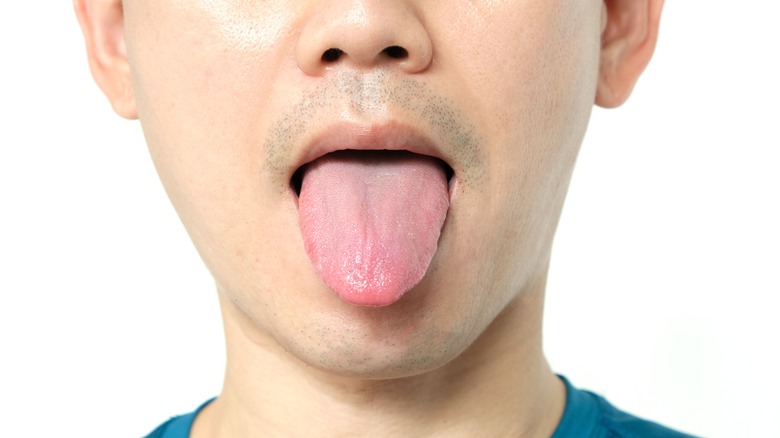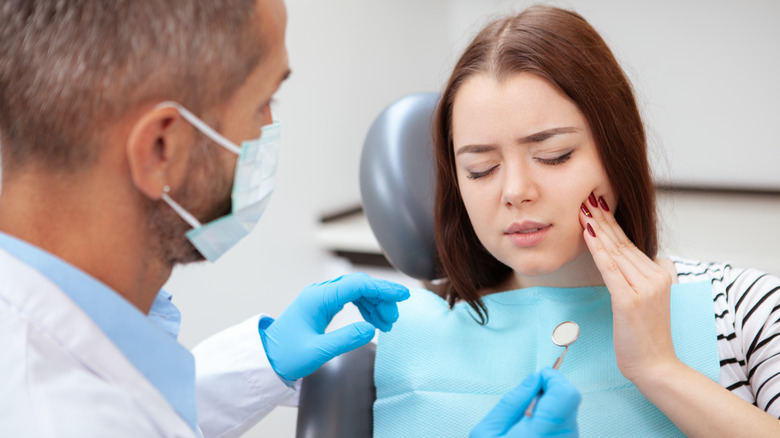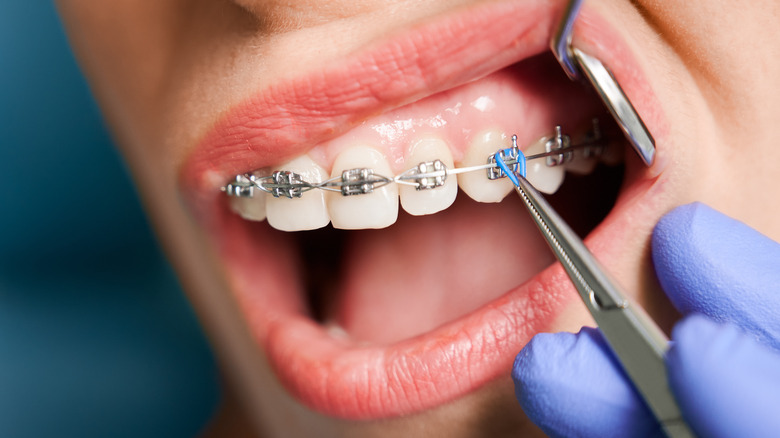Having bad breath can be an embarrassing situation, to say the least. Even though it happens to everyone at some point, it’s likely that no one actually wants to have bad breath. The medical term for bad breath is halitosis, and it can have many causes, ranging from diet to smoking to poor oral hygiene habits, according to Mayo Clinic. The good news is that there are solutions to many underlying causes of bad breath, so you don’t have to worry about breathing out smelly odors around others.
Dr. Sharda Patel, the head of Dental Oasis Family Dentistry in Pleasanton, CA, and a member of the American Dental Association, tells Health Digest in an interview that “Bad breath is a condition that negatively affects both your personal and professional life. Every individual must have experienced bad breath at least once in their life. Unfortunately, the majority of the time, it is somebody else who notices that you have bad breath before you can figure it out yourself.”
If you find yourself with a sour or metallic taste in your mouth, there’s a good chance you may be emitting bad breath. Dr. Patel says that ways to keep bad breath at bay include practicing good oral hygiene, scheduling regular dental checks every six months, and rinsing your mouth with water after eating.
Beyond the basics, there are signs and symptoms associated with bad breath-inducing conditions that you should know about in case you find yourself with halitosis. Here’s what you should know about conquering bad breath.
Cultivate good hygiene habits

Bad breath caused by foods you eat, like garlic, is generally temporary, says Dr. Patel. However, bad breath that doesn’t resolve may indicate that something else is going on in your mouth.
“If you are not brushing and flossing regularly or not using the correct methods, the bad bacteria in your mouth, which cause bad breath, increase in number and give you a foul breath. Therefore, brushing two times a day, and flossing once a day, especially during bedtime, is really essential to protect you from bad breath,” emphasizes Dr. Patel, who recommends using soft toothbrushes over hard ones, or electronic toothbrushes if you dislike manual options, and replacing your toothbrush or electric toothbrush head every three months.
When it comes to flossing, Dr. Patel advises, “If you find it difficult to use floss strings, you can switch to a water flosser. Choose the method in which you find yourself comfortable but do not let these bad bacteria build up in your mouth.”
Oftentimes, an unhygienic tongue is the culprit. “Bad breath is produced by bacteria that produce sulfur in the mouth. These bacteria degrade proteins and form volatile sulfur compounds, which causes bad breath. So, even if you are brushing and flossing properly, you will get bad breath if you are not cleaning your tongue,” says Dr. Patel, who encourages using a tongue scraper to sufficiently clean your tongue, alongside regular brushing and flossing, to rid your mouth of as many halitosis-causing germs as possible.
Add good bacteria and saliva

Prioritizing oral hygiene and ridding bad bacteria from your mouth not only prevents bad breath, but Dr. Patel explains that an additional benefit of regular oral hygiene is keeping your smile looking white on its own rather than having to rely on teeth whitening products and services.
Another tip Dr. Patel provides is taking oral probiotic supplements or eating sugar-free yogurt to introduce good bacteria into your mouth. “Oral probiotics are supplements that contain the good bacteria that you need. These supplements maintain a good balance of good bacteria (Lactobacillus) in your mouth which in return keeps your mouth healthy and prevents gum diseases and bad breath,” states Dr. Patel, who stresses that yogurt and oral probiotics should not be used in place of oral hygiene practices but should instead be used in addition to daily flossing, brushing, and tongue scraping.
If you’re practicing good oral hygiene but still experiencing bad breath, Dr. Patel says, “The probable reason would be dry mouth (lack of saliva). A dry mouth is also called xerostomia in medical terms. Saliva has a role in neutralizing acids in the mouth; they keep the mouth and teeth moist and fight against the bad bacteria in the mouth.”
Dry mouth can be a medication side effect, but also occurs from dehydration. “Keeping yourself well-hydrated throughout the day by drinking a lot of water can prevent dry mouth, preventing bad breath. Apart from this, chewing sugar-free gums can also stimulate saliva production in your mouth,” Dr. Patel adds.
Protect against gum disease and tooth decay

MAD_Production/Shutterstock
Gum diseases, such as gingivitis and periodontitis (inflammation of the gums), can be caused by a lack of good oral hygiene, and should be taken seriously. “These gum diseases promote the growth of bacteria, and can even result in bleeding gums and pus formation and create an unhygienic oral environment that gives a foul odor. Bleeding gums even give an unpleasant taste to the mouth,” says Dr. Patel.
If your gums become swollen, red, or bleed, then bad breath is likely. You can take this as another reminder that the best ways to practice healthy oral hygiene include brushing, flossing, tongue scraping, and drinking water throughout the day, especially after eating.
Tooth decay, including cavities, can also be a cause of bad breath, because it involves bad bacteria, which allow halitosis to thrive in your mouth. As Dr. Patel explains, “Cavities are caused by bacteria in your mouth destroying the tooth’s surface, which leads to tooth decay. After eating or drinking, bacteria feed on food scraps or sugars that may have remained in the mouth, generating acids that wear away at the surface of your teeth. Your risk of tooth decay increases, and a cavity is more likely to develop the longer bacteria and acids are in touch with your tooth.”
The negative process becomes cyclical, with food particles becoming trapped in cavities and intensifying tooth decay, thus increasing bad breath. Regular visits for dental cleanings and examinations can catch cavities and decay early.
Debunking myths about braces and bad breath

anatoliy_gleb/Shutterstock
The thought of wearing braces might revive memories from middle school, but adolescents and adults alike can wear braces. Dr. Patel debunks myths about braces on their own being the cause of bad breath by explaining that wearing braces alone won’t give you bad breath, but rather that “It’s the failure to maintain proper oral hygiene with braces that causes bad breath. Brushing and flossing with braces is slightly different and more complex than regular brushing and flossing. Therefore, it is necessary to follow all the oral hygiene instructions your orthodontist gives to prevent bad breath.”
A mouth with an orthodontic treatment like braces should adhere to the same practices as a mouth without braces, but perhaps with some additional steps to prevent bacteria from growing around the orthodontic device or the brackets of braces.
Regardless of whether or not you have braces, you should pay attention to clues of halitosis and remain tuned in to the taste in your mouth. For instance, if your mouth develops a metallic or sour taste, an indicator of having breath with foul odor, see if you can attribute it to a recent food you’ve eaten like garlic or onion.
Don’t skip regular dental check-ups every six months, and remember to practice daily oral hygiene, including brushing, flossing, and tongue scraping. If your bad breath persists, or you notice symptoms of gum disease or tooth decay, schedule an appointment with your dentist.
To learn more about Dr. Sharda Patel, visit her website.




